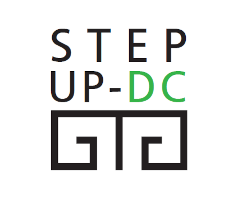Session 3, Human Rights and Human Rights Education
STEPUP-DC Project

Course DescriptionBasic Topics
- Human rights
- Human dignity
- Human rights education
- Children’s rights
- Right to education
- Rights and responsibilities
- Critical pedagogy
- Human rights-based approach to education
Duration
The duration of the session is 9 hours (3 reading + 3 learning + 3 working/practicing)
Objectives
The Objectives of this session are:
- Support students in developing a basic, critical understanding of the history and philosophy of human rights.
- Familiarize students with the aims and definition of human rights education -- as part of quality education – as established by the United Nations.
- Support students in identifying human rights values and human rights standards to integrate into their teaching.
- Introduce ‘critical pedagogy’ – with analysis, reflection and taking action – as the praxis for human rights education.
- Guide students in applying a human rights-based approach to all aspects of school life.
- Develop students’ confidence to learn more about human rights – including online resources - and the relevance of human rights for everyday life.
- Familiarise students with key tools on EDC-HRE including the EDC-HRE teaching resource series.
Learning outcomes
After completion of the session students will:
- Understand the origins and history of human rights and the links between human rights values and democratic governance;
- Have ideas about how human rights values and standards can be incorporated into teaching and learning processes, and the school environment overall.
- Reflect on the aforementioned in developing methods for their own classrooms that promote the development of competences for democratic culture.
Outcomes and CDC
- Knowledge and critical understanding
- Including politics, law, human rights, cultures, religion, etc.
- 117: Can explain the meaning of basic political concepts, including democracy, freedom, citizenship, rights and responsibilities (basic)
- 118: Can explain why everybody has a responsibility to protect the human rights of others (basic)
- 124: Can reflect critically on the relationship between human rights, democracy, peace and security in a globalised world (intermediate)
- 123: Can explain the universal, inalienable and indivisible nature of human rights (intermediate)
- 131: Can reflect critically on the evolving nature of the human rights framework (advanced)
- Values
- Valuing human dignity and human rights
- 101: Argues that human rights should always be protected and respected (basic)
- 102: Argues that specific rights of children should be respected and protected by society (basic0
- 103: Argues that everyone should recognise the fundamental freedoms of each human being (basic)
- 105: Argues that all public institutions should respect, protect and implement human rights (intermediate)
- 106: Defends the view that human rights are required for every human being to be able to live with dignity (intermediate)
- 108: Expresses the view that all laws should be consistent with international human rights norms and standards (advanced)
- Attitudes
- Respect
- 502: Expresses respect for other people as equal human beings (basic)
- 503: Expresses respect for different opinions, world views and ways of life unless they violate human rights (basic)
- 507: Expresses respect for different opinions or ideas unless they violate human rights (intermediate)
- 509: Expresses respect for others based on the recognition of the dignity of all persons and of their human rights (intermediate)
- Civic Mindedness
- 603: Expresses readiness to contribute to improving the situation of other people in the community (basic)
- 605: Expresses commitment to not being a bystander when the dignity and rights of others are violated (intermediate)
- 610: Expresses commitment to sustaining and safeguarding the human rights of other people (intermediate)
- Skills
- Analytical and Critical Thinking Skills
- 1101: Can identify similarities and differences between new information and what is already known (basic)
- 1110: Can make evaluations on the basis of evidence and experience (basic/intermediate)
- 1111: Can analyse alternative points of view (basic/intermediate)
- 1136: Can evaluate critically the actions of those who have responsibilities to respect, promote and realise human rights (intermediate/advanced)
- Empathy
- 1302: Expresses sympathy for the bad things that he/she has seen happen to other people (basic)
- 1303: Expresses compassion for people who are being treated unfairly (intermediate)
- 1320: Expresses sympathy for people who are less fortunate than himself/herself (intermediate)
- 1325: Expresses the view that, when he/she thinks about people in other countries, he/she shares their joys and sorrows (advanced)
- Human rights
- Human dignity
- Human rights education
- Children’s rights
- Right to education
- Rights and responsibilities
- Critical pedagogy
- Human rights-based approach to education
The duration of the session is 9 hours (3 reading + 3 learning + 3 working/practicing)
The Objectives of this session are:
- Support students in developing a basic, critical understanding of the history and philosophy of human rights.
- Familiarize students with the aims and definition of human rights education -- as part of quality education – as established by the United Nations.
- Support students in identifying human rights values and human rights standards to integrate into their teaching.
- Introduce ‘critical pedagogy’ – with analysis, reflection and taking action – as the praxis for human rights education.
- Guide students in applying a human rights-based approach to all aspects of school life.
- Develop students’ confidence to learn more about human rights – including online resources - and the relevance of human rights for everyday life.
- Familiarise students with key tools on EDC-HRE including the EDC-HRE teaching resource series.
After completion of the session students will:
- Understand the origins and history of human rights and the links between human rights values and democratic governance;
- Have ideas about how human rights values and standards can be incorporated into teaching and learning processes, and the school environment overall.
- Reflect on the aforementioned in developing methods for their own classrooms that promote the development of competences for democratic culture.
- Knowledge and critical understanding
- Including politics, law, human rights, cultures, religion, etc.
- 117: Can explain the meaning of basic political concepts, including democracy, freedom, citizenship, rights and responsibilities (basic)
- 118: Can explain why everybody has a responsibility to protect the human rights of others (basic)
- 124: Can reflect critically on the relationship between human rights, democracy, peace and security in a globalised world (intermediate)
- 123: Can explain the universal, inalienable and indivisible nature of human rights (intermediate)
- 131: Can reflect critically on the evolving nature of the human rights framework (advanced)
- Including politics, law, human rights, cultures, religion, etc.
- Values
- Valuing human dignity and human rights
- 101: Argues that human rights should always be protected and respected (basic)
- 102: Argues that specific rights of children should be respected and protected by society (basic0
- 103: Argues that everyone should recognise the fundamental freedoms of each human being (basic)
- 105: Argues that all public institutions should respect, protect and implement human rights (intermediate)
- 106: Defends the view that human rights are required for every human being to be able to live with dignity (intermediate)
- 108: Expresses the view that all laws should be consistent with international human rights norms and standards (advanced)
- Valuing human dignity and human rights
- Attitudes
- Respect
- 502: Expresses respect for other people as equal human beings (basic)
- 503: Expresses respect for different opinions, world views and ways of life unless they violate human rights (basic)
- 507: Expresses respect for different opinions or ideas unless they violate human rights (intermediate)
- 509: Expresses respect for others based on the recognition of the dignity of all persons and of their human rights (intermediate)
- Civic Mindedness
- 603: Expresses readiness to contribute to improving the situation of other people in the community (basic)
- 605: Expresses commitment to not being a bystander when the dignity and rights of others are violated (intermediate)
- 610: Expresses commitment to sustaining and safeguarding the human rights of other people (intermediate)
- Respect
- Skills
- Analytical and Critical Thinking Skills
- 1101: Can identify similarities and differences between new information and what is already known (basic)
- 1110: Can make evaluations on the basis of evidence and experience (basic/intermediate)
- 1111: Can analyse alternative points of view (basic/intermediate)
- 1136: Can evaluate critically the actions of those who have responsibilities to respect, promote and realise human rights (intermediate/advanced)
- Empathy
- 1302: Expresses sympathy for the bad things that he/she has seen happen to other people (basic)
- 1303: Expresses compassion for people who are being treated unfairly (intermediate)
- 1320: Expresses sympathy for people who are less fortunate than himself/herself (intermediate)
- 1325: Expresses the view that, when he/she thinks about people in other countries, he/she shares their joys and sorrows (advanced)
- Analytical and Critical Thinking Skills
A series of resources that the student teacher must study in this session and a series of additional resources for further study.
A full paper and additional e-lessons on the topics of the session and additional interactive presentation of the materials, for the student teachers to study all the materials in a row.
A series of authentic, up to date and relevant activities with their accompanying materials, which deliver the intended learning outcomes of the session and are carried out face to face or E-learning with groups of student teachers.
Several types of questions to evaluate how much the student teachers have learned throughout the session (reading material, learning material and workshop).
